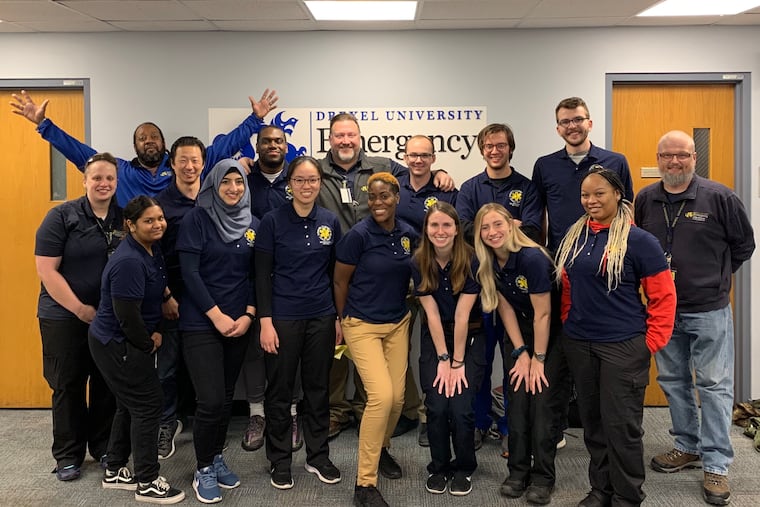When 911 needs help, who can they call? Not Drexel. | Opinion
By closing its EMS training program, Drexel University is turning its back on the city just as pandemic recovery is beginning.

Despite the best efforts of medical providers and facilities around the world, the coronavirus pandemic has revealed gaps in readily affordable and accessible medical care, particularly in the city of Philadelphia. While city officials do their best to ensure equitable vaccine access to restore a sense of normalcy, the whole Delaware Valley region needs to begin bracing for a longer-term, unforeseen repercussion — a shortage of EMS first responders as one of the city’s only training centers is slated to close its doors.
Ambulance services and hospital systems nationwide have been experiencing a deficit of emergency medical technicians and paramedics even prior to COVID-19. The Philadelphia area has been no stranger to this, with residents experiencing response times of over 12 minutes as a result of the demand on the EMS system taking 700-1,000 calls per day and an inadequate number of paramedics in the city. At any given time, 25% to 50% of ambulances in the city are staffed by firefighters working overtime hours. In spite of the already critical need for EMS providers, since the start of the pandemic, EMS training facilities have reduced or even closed operations completely.
Philadelphia will face an even bigger shortage of first responders and is at grave risk of a new public health crisis in the months and years to come.
» READ MORE: Inside the lives of paramedics on the front lines of the coronavirus pandemic
Drexel University’s College of Nursing and Health Professions (CNHP) will cease operations of its EMS Training Center effective June 30. This means Philadelphia will now only have one operational EMS training facility, JeffSTAT Education Center. The university cited insurmountable financial constraints from the pandemic — despite seeing 238% growth in student enrollment since the start of COVID-19 — and looming debts from the Hahnemann University Hospital closure as its rationale for closing the facility. Drexel’s EMS Training Center serves a student body of roughly 68% people of color, 60% females, and 60% Philadelphia residents.
The biggest concern among staff and the Philadelphia Regional EMS Council is the cascading, long-term effect caused by closing one of the busiest training centers in the region that is currently turning out about 80 new EMS providers every academic term. By only having one operational training center for individuals to begin their EMS career, the number of newly certified EMTs (EMT-B) are cut in half. In order to work for the Philadelphia Fire Department as an EMS provider, one must be at an advanced level as either an advanced EMT (AEMT) or a paramedic (EMT-P). One cannot become an advanced practitioner until one is certified at an EMT-B level. And while the Philadelphia Fire Department trains its EMS providers at Chestnut Hill Hospital, CHH only offers AEMT and paramedic training at this time, and faces an uncertain future as the Tower Health system grapples with its crippling financial woes.
Drexel’s EMS Training Center has trained medical providers for the past 11 years across the tristate area and served as the overseeing body of the Drexel University EMS Squad. It is the busiest training center in advanced trauma life support (ATLS) — a mandatory credential for all trauma surgeons and emergency department doctors — and was one of the only American Heart Association training centers active during the pandemic. The department also hosted multiple community training programs, including the West Philadelphia Skills Initiative (WPSI), the University City District’s skills development program that seeks to close the gaps in workforce opportunity. Now, WPSI students, and any Philadelphia resident seeking workforce opportunities in EMS, will have to either pay the full tuition for JeffSTAT’s program (current course cost of $2,000 excluding uniform fees), seek education outside Philadelphia County, or wait and hope that more EMS training programs will open up or resume operations.
The lack of EMS providers in the Philadelphia area is not a new problem. But between COVID-19 and Drexel’s disheartening decision to close its highly regarded EMS Training Center, it is slated to become a dire public health emergency that cannot continue to be ignored.
It is morally reprehensible to watch Drexel University turn its back on the wider Philadelphia community, especially as the city braces for a possible fourth wave of the virus while attempting to emerge from the devastating impact of the pandemic.
Amanda Rock is an active EMS provider, an EMS educator at Drexel University, and a passionate advocate for equitable, engaging, and affordable educational opportunities. Outside of her role in EMS, she works in HR, enabling companies to create international hiring strategies and hire talent globally.